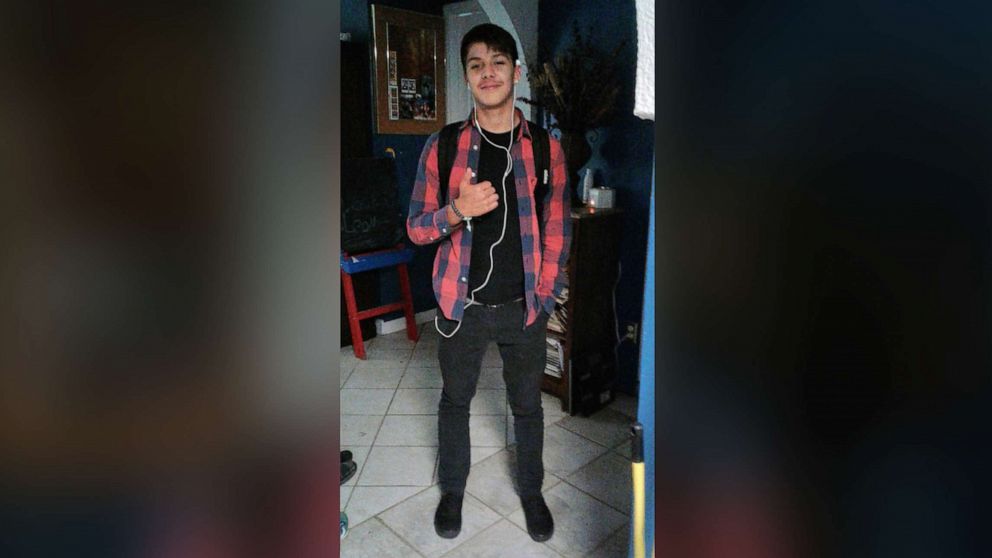Why Georgia teen who left Mexico as a baby was deported
For the most part, Brandon Dali Salinas felt like an American.
The 18-year-old is from the small town of Dalton in Northwest Georgia and has a thick Southern accent. He attended his local church, was a Boy Scout, and helped his mom with a little brother who has asthma. Salinas has lived in the United States for almost 17 years, and all three of his siblings and his now-estranged father are United States citizens.
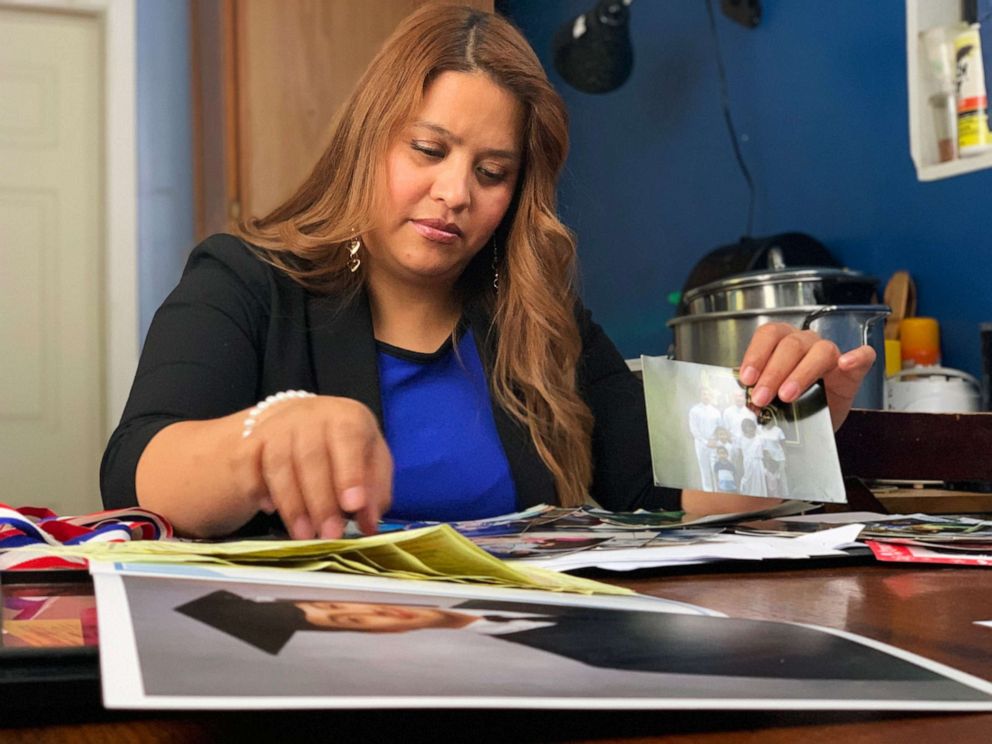
Now, he has been deported to Mexico, a country that is completely foreign to him, following an arrest on charges of possessing a small amount of marijuana and lying to police about his age last April. Salinas, who drove without a license in 2018, had violated his probation with this new arrest. But since he was a minor at the time, sheriff’s deputies drove him home to his mother.
Salinas admits he made mistakes. But what for many young Americans would be an arrest with few long-term consequences, Salinas faces a life-altering ordeal thousands of miles away from his family.
“I wouldn’t consider Mexico my home even though I'm from there,” Salinas told ABC News recently. “I wouldn't consider it because I wasn't raised there. I didn't grow up there. I was just born there."
The Trump administration has pushed to arrest more unauthorized immigrants while both eliminating Obama-era rules that prioritize dangerous felons and canceling basic protections for young people like Salinas living in the country without proper documentation. As more and more kids -- who came to the U.S. as young children -- reach adulthood, the recent attempts to close off avenues for resettlement and rehabilitation mean small, unresolved crimes can have dire consequences for them.
“I don’t think he had a care in the world when he was making the mistakes that any kid would make. The problem is that he’s undocumented at the same time,” said Mark Scaggs, a project coordinator for the Southern Poverty Law Center.
Speaking to ABC News about his arrests, Salinas said he’s “always regretted it, each and every day -- just knowing that I could have been a better person.”
After he was arrested in April and then released to his mother, Salinas graduated from high school and then celebrated his eighteenth birthday. Thirteen days later, on May 7, the police knocked on his door. They re-arrested him and booked him into jail, charging him with five separate counts, including marijuana possession, lying to authorities about his age and violating his probation from the 2018 incident.
He remained in jail for three months. After his mother, Ivon Castillo (who asked that ABC News not use her full name because she feared reprisal from authorities), posted bond for him on Aug. 1, he wasn't immediately released. A month later, he was transferred directly into ICE custody, according to sheriff's department records. He remained in the Folkston, Georgia ICE processing facility for five months.
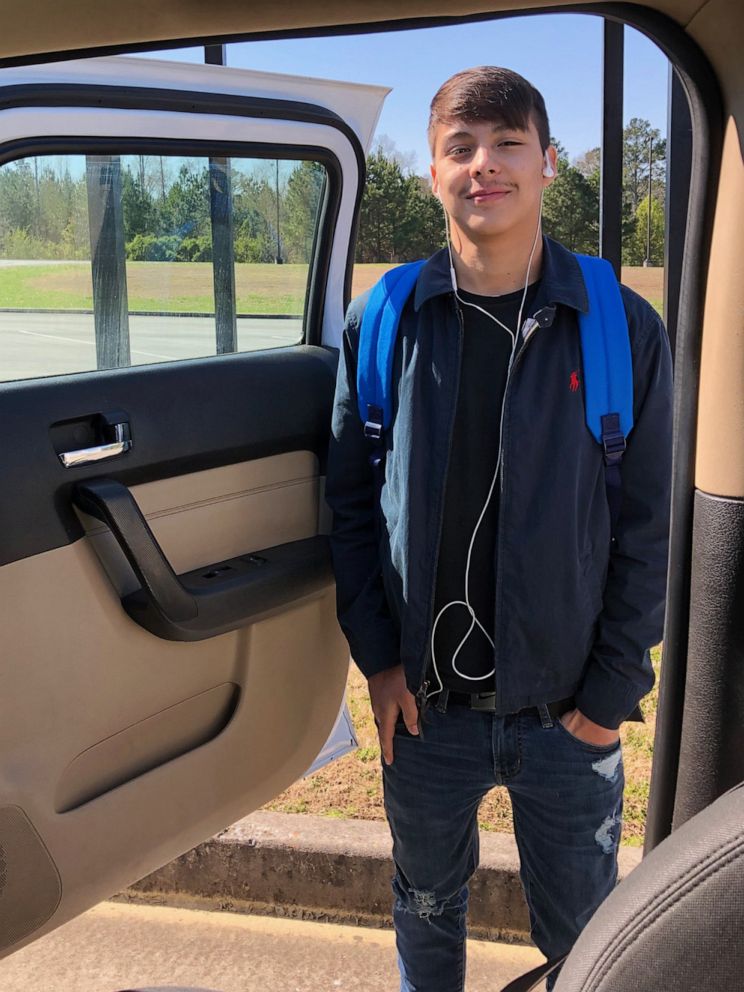
The Whitfield County Sheriff’s Office did not return ABC News’ requests for comment about why Salinas was not released on bond or about their broader cooperation policy with ICE.
Whitfield County, like several other local law enforcement jurisdictions in the southeast, maintains a working agreement with ICE to flag all undocumented persons who are detained by local sheriff's deputies -- no matter how small the offense, according to a local ICE official.
Salinas was one of them.
ICE agreements with law enforcement
President Donald Trump and his administration have strongly encouraged local law enforcement agencies to adopt these “287(g)” agreements with ICE, products of Clinton-era immigration law that make use of local community resources for federal immigration enforcement.
The same types of programs were initially encouraged during the Obama administration when deportations hit record levels. But civil rights groups and big cities across the country started pushing back. Several jurisdictions -- including New York and Los Angeles -- created so-called “sanctuary” policies to limit cooperation between local police and ICE. The Obama administration later reversed course to prioritize the deportation of violent felons with criminal convictions.
“What the Obama administration did was really narrow that net for arrests,” said Randy Capps, research director at the Migration Policy Institute. “That kind of shut down this universal screening model.”
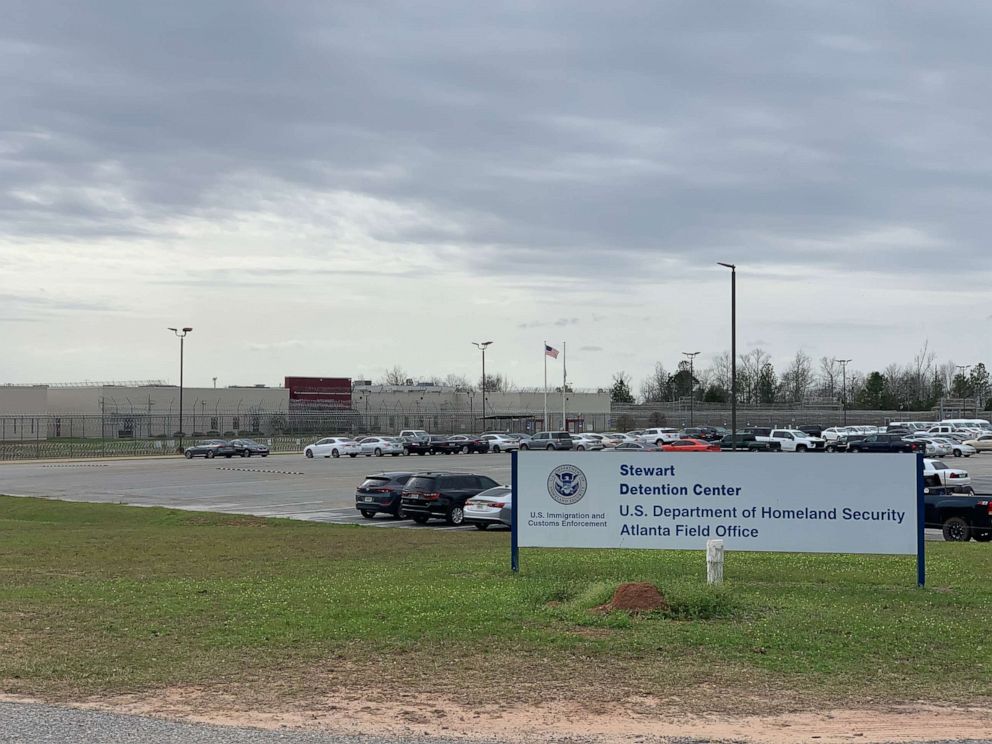
During his first month in office, President Trump issued an executive order to promote the type of universal screening that currently takes place in counties like Whitfield County, and also to eliminate the Obama-era priority of removing those convicted of violent and other major crimes.
“The percentage of offenses that are serious is very small,” Capps said.
Trump administration officials point to the serious criminals picked up by the 287(g) programs. In budget year 2018, local officials across the country flagged 13 unauthorized immigrants who had been convicted of homicides and 150 convicted for sex offenses, including sexual assault. But smaller offenses like marijuana use and traffic violations are generally more common, resulting in more ICE arrests for those accused of minor crimes.
John Tsoukaris, the acting ICE field office director for the Atlanta region where Salinas was taken into custody, acknowledged that 287(g) programs can result in those who are merely accused of minor crimes getting deported, but noted his agents are required to arrest anyone they encounter without proper documentation.
“I’m not sure it’s appropriate to exclude those individuals just because they have minor crimes," Tsoukaris said. “I think you actually have the right under the authority of the law to stop these people from re-offending because they are not supposed to be here and they can be removed.”
“We’re a country of laws and we expect everybody to follow it,” he added.
Charges and convictions for traffic violations, driving under the influence and illegal drug use are the most common infractions seen among those arrested by ICE followed by assault and immigration-related violations, according to the most recent data released by the agency.
DACA no longer an option for many
Simply by living in the United States undocumented, Salinas was committing a civil violation under federal law, thus potentially eligible for deportation.
“I always realized I was different from everybody else,” Salinas said. “I had to limit myself in the things I could do. I was limiting myself -- like I can’t drive a car to take my girlfriend out to eat. Or I couldn’t apply for certain jobs.”
Like a growing number of undocumented teens, he hadn’t applied for the Deferred Action for Childhood Arrivals (DACA) program protection as a child, which would have given him some license to live and work in the U.S. Around the time he would have needed it for driving, college or working, the Trump administration was ending enrollment for new applicants.
Salinas’ mother told ABC News she had hoped for a more permanent solution. She wanted Salinas’ father, a U.S. citizen, to petition for her son’s legal status when he was a young teen. But Salinas’ parents got divorced, they lost contact with his father, and an application was never started.
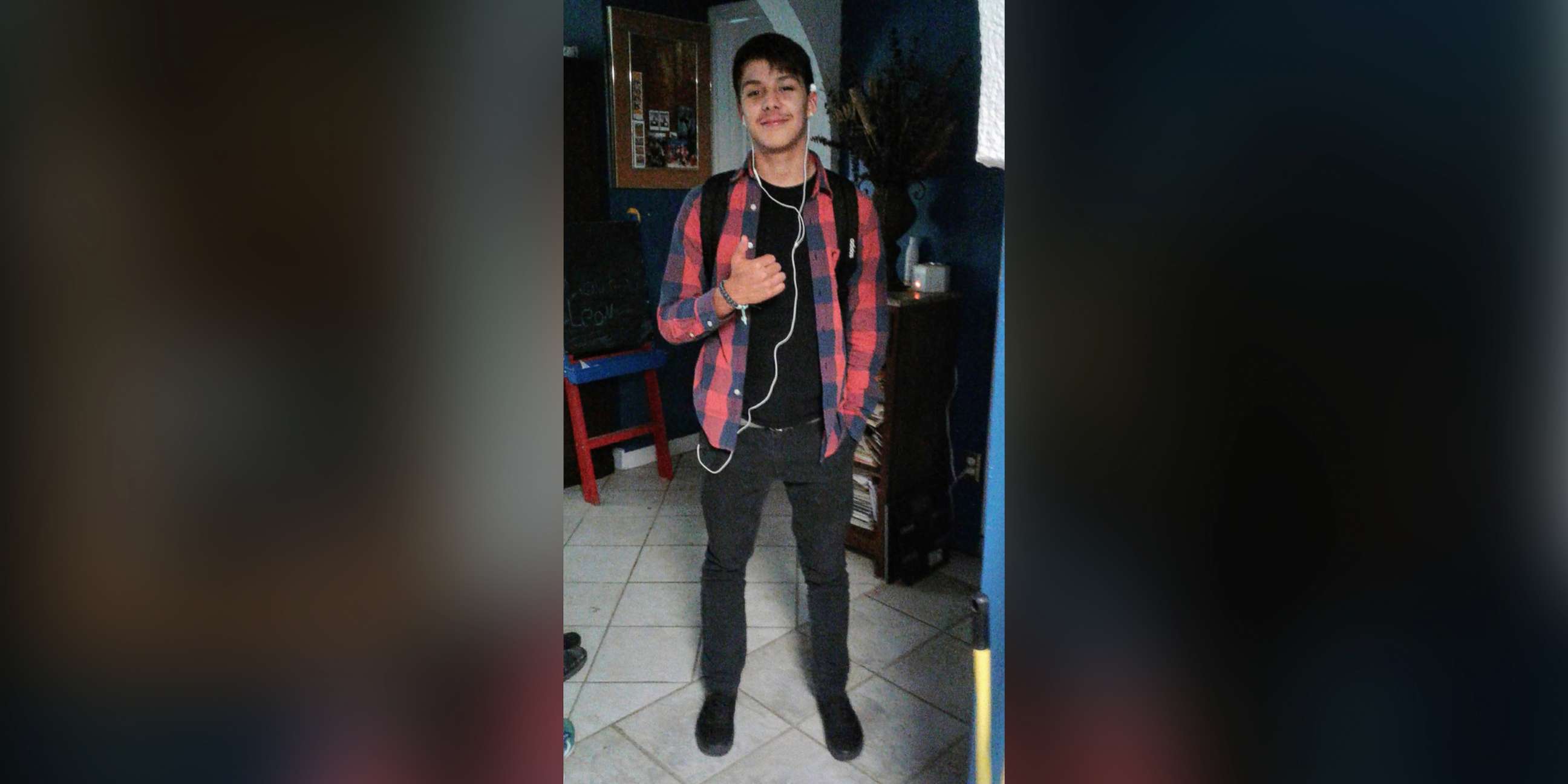
The DACA program is now tied up in the courts, but initiating a new application hasn’t been possible since 2017, meaning the number of unprotected, undocumented teens like Salinas will likely grow for the foreseeable future unless the Supreme Court rules to fully reinstate it, or Congress steps in with a more permanent solution. Even if he had gotten into the program, under the Trump administration, undocumented teens have increasingly seen their protections stripped even for minor infractions, meaning a second chance for someone like Salinas is rare.
'Sometimes you don't get second chances'
Castillo told ABC News that her son is a “big mama’s boy” and that they tried to speak every other day while he was detained. She says he was “desperate” to get out.
“I just wanna tell her that I love her,” Salinas told ABC News recently. “And if I could change the past, if I could be a better person in the past, I would. But I can't. And that's what I regret each and every day.”
Since legally becoming an adult, Salinas has spent about two weeks free and 8 months behind bars.
“I want to support my family how they support me,” Salinas said while in custody. “I just -- I’ll be strong for them. I’ve spent a lot of time in here reading the Bible, and it says patience is key.”
Salinas had his first court date with immigration judge Wayne Houser, Jr., an immigration judge, in October 2019. Houser has been an immigration judge in Atlanta since 2002, having spent over 20 years practicing law in Tennessee before then. From 2014-2019, he had a 96% asylum denial rate, according to TRAC Immigration, an independent project from Syracuse University.
According to Fernando Chavez, Salinas’ lawyer, who didn’t start representing him until this month, Houser tends to be harsher on undocumented immigrants.
“He’s known as the guy who denies everything. His bond denial rate might be higher than his asylum denial rate,” said Chavez, referencing Houser’s denial rate.
“And not only that, he moves at such a slow pace in his cases,” Chavez added.
The Department of Justice and Executive Office for Immigration Review don’t comment on judge’s decisions.
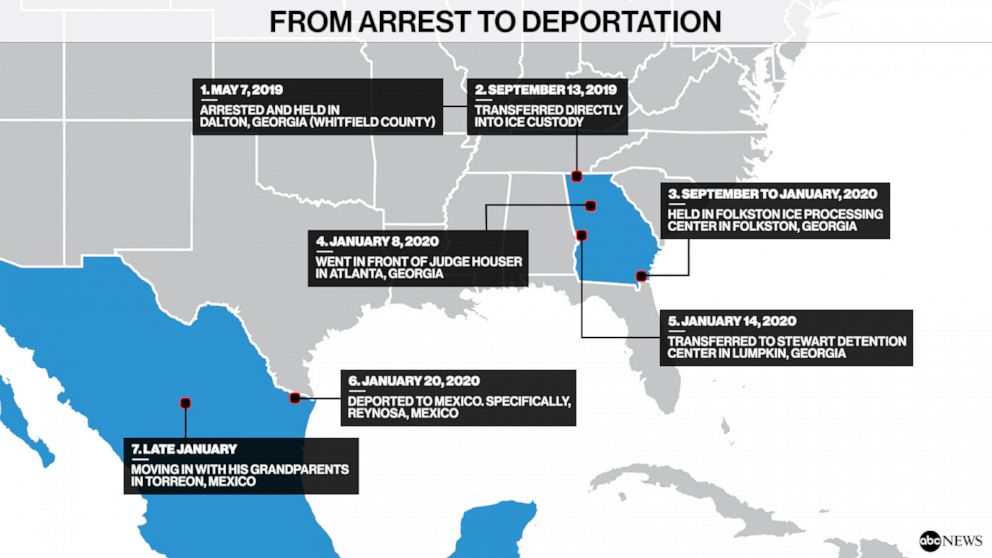
Salinas was scheduled to see Houser a total of three times in the fall of 2019. But he only saw him once.
Then, on Jan. 8, his case number was finally called. Salinas went in front of Houser with no attorney representing him.
According to Salinas, Houser asked him what form of "relief" he wanted, but Salinas didn’t know what that meant.
Salinas’ request for voluntary departure, which would have let him leave the United States on his own terms, was denied by the judge.
As a last attempt, Salinas admitted that he had gone “down the wrong road;” that he had made “bad mistakes and bad decisions;” that he never “wanted to be that person.” He said he told Houser he regretted his decisions, and that he tries to improve himself each and every day.
“I just want to push myself to do better, and I feel like if I could have another opportunity -- just do things right -- I will,” Salinas told ABC News.
According to Salinas, Houser responded “sometimes you don’t get second chances.” Houser went on to order Salinas’ removal from the United States to Mexico. It was just the second time Salinas officially appeared in Houser’s court.
Salinas was deported on Jan. 20, 2020.
“He sounds shocked because he’s in a new place with new people," Castillo told ABC News. "But he sounds happy to be out [of detention].”
According to Castillo, the plan is to have Salinas live with her parents in Torreon, Mexico, despite the fact that he has never met them.
“So I feel like I just gotta have faith that God is gonna get me to the way and just to keep my head up,” Salinas said. “You know, it's not the end of me.”
ABC’s Ignacio Torres contributed to this report.
